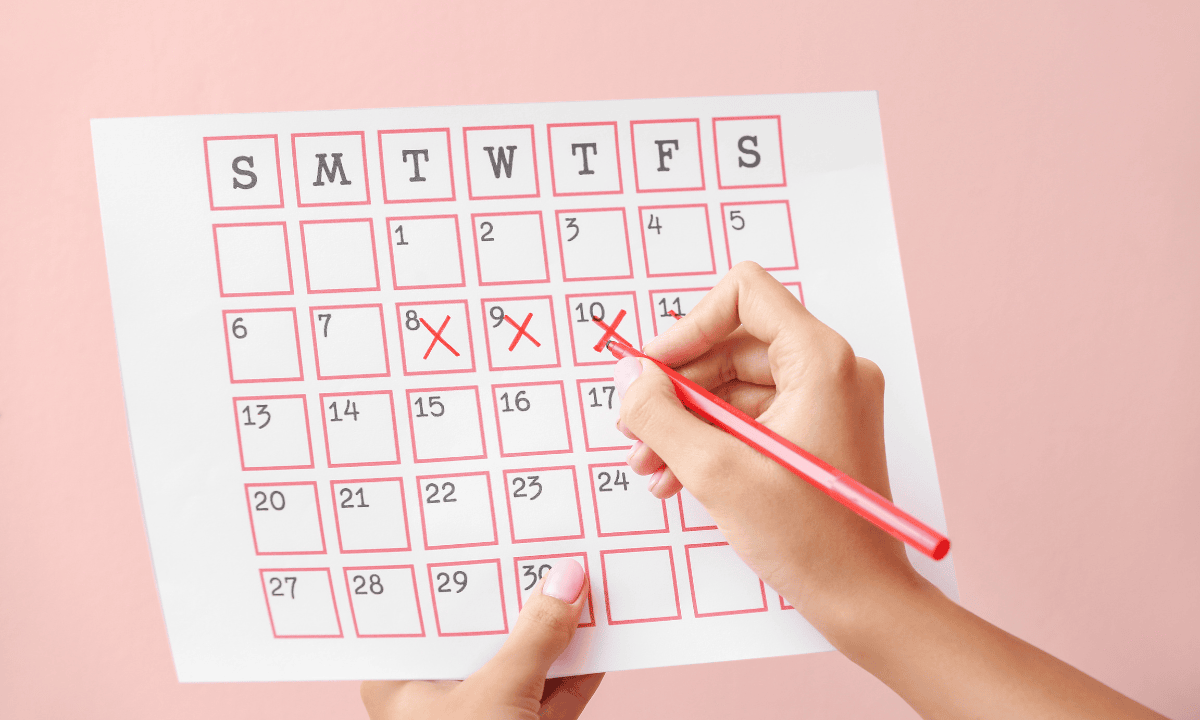Your periods haven't returned since you gave birth and you're starting to wonder if you should be concerned. While it's normal for periods to be absent for a while, particularly if you're breastfeeding, how long should you wait before seeing your doctor?
Why hasn't your period returned since you gave birth?
It’s common not to get your period immediately after giving birth because postbirth menstruation depends on hormones, especially if you're breastfeeding. Prolactin, the hormone responsible for milk production, suppresses ovulation and consequently delays the return of your period.
Every woman recovers at her own pace. Some can have their periods back after a few weeks, while others need to wait several months. The return of menstruation is influenced by the following factors:
How the baby is fed
The state of hormone level in your body
The general condition of the body and the stage of postpartum recovery
What ishappening in your body after pregnancy?
After childbirth, your body goes through major hormonal changes. Oestrogen and progesterone hormone levels fall quickly, while prolactin rises. This shift often suppresses ovulation, which can delay the return of your menstrual cycle.
At the same time, your uterus (womb) is healing, and your reproductive system is slowly adjusting back to its pre-pregnancy state. These changes are a normal part of recovery and can affect how soon your period returns.
How soon after giving birth can you get your period?
If you’re not breastfeeding, your period may return as early as 6 to 8 weeks after delivery. But if you’re exclusively breastfeeding, your period may be delayed for 6 months or longer.
This is because the Lactational Amenorrhoea Method (LAM), the body’s natural response to frequent nursing, suppresses ovulation and can postpone menstruation. Although every woman’s timeline is different, both scenarios are considered normal.

How do you know when your period is coming back after pregnancy?
Your body often gives early signs that menstruation is returning. Common indicators include:
Mild cramping similar to pre-period pains
Noticeable changes in vaginal discharge
An increase in cervical mucus
Breast tenderness
Mood swings or PMS-like symptoms
Factors that influence the post-pregnancy menstrual cycle
Several factors can affect the timing of your menstrual cycle's return after pregnancy:
Breastfeeding:
When you breastfeed, your body produces prolactin. High levels of prolactin suppress ovulation, often delaying the return of your period. The effect is stronger with frequent nursing, especially at night.
As feedings decrease or weaning begins, prolactin levels drop, making it more likely for your cycle to resume.
Hormonal changes:
After childbirth, your body goes through major hormonal shifts. These changes can affect the timing of your first period.
Physical recovery:
Every woman’s healing process is unique. The pace of recovery can vary when your menstrual cycle normalises.
Stress and lifestyle:
Adjusting to life with a newborn – lack of sleep, stress, or changes in routine – can also affect your hormones and delay menstruation.
For more personalised information about the postbirth period and to discuss your individual circumstances, consider consulting a pregnancy specialist. Contact Thomson Women’s Clinic to schedule a consultation and receive guidance tailored to your needs.
Our pregnancy specialists
Loading...
When to worry about no period after pregnancy?
It's normal not to have a period after giving birth. But if you have any of these symptoms, consult with your doctor to ensure you're healthy after giving birth.
Signs that need medical attention, such as:
If you have really bad or ongoing pain:
Postbirth cramping is normal, but severe pain may indicate a problem. These may include infections, problems with the womb, or other medical conditions that need to be checked out and treated straight away by a doctor.
There are some unusual types of bleeding:
The discharge that occurs after childbirth, known as lochia, should decrease in volume over the course of several weeks.
If you have any signs of sudden heavy bleeding or large blood clots appearing months after giving birth, you should get urgent medical help. These symptoms could mean that there is some tissue left behind in your womb or that your womb has a problem.
Longer absence:
Breastfeeding mothers often have delayed periods because of changes in the hormones in their body. However, periods usually return within six months for women who don't breastfeed.
If you are away from your usual routine for longer than this, you might need to see a doctor. They can check if you have hormonal imbalances, thyroid problems, or low oestrogen levels.
Some more symptoms to watch out for:
Watch out for other signs of the disease, such as feeling very tired and losing hair for no reason, or feeling very happy or very sad for no reason. You should also watch out for feeling dizzy often.
These symptoms could be a sign of problems like postpartum thyroiditis (inflammation of the thyroid after pregnancy), anaemia, or other hormonal issues that need to be checked by a doctor.
If you have concerns about your period, such as a delay that is longer than expected or unusual symptoms, discussing this with your doctor during your postbirth check-ups can help to rule out hormonal imbalances or other health issues.
Postbirth care with Thomson Medical
These appointments are typically scheduled around six weeks after delivery and are designed to monitor your physical and emotional recovery. During these visits, your doctor can:
Evaluate how your body is healing and check your overall recovery.
Monitor any ongoing health conditions that may affect your hormonal balance.
They can also address your concerns and answer questions you may have, such as when your period might return.
If you had pregnancy-related or pre-existing health conditions, you may need more frequent monitoring during the postbirth period:
Blood pressure checks for mothers with pregnancy-induced hypertension or chronic hypertension, sometimes with guidance on home monitoring.
Diabetes management for mothers with gestational diabetes or pre-existing diabetes, including adjustments to insulin or oral medications as needed.
These conditions can both affect your hormones and influence when your menstrual cycle returns to normal.
As part of your postnatal care, you may receive support services such as lactation consultants to provide breastfeeding guidance, referrals to confinement nannies to assist with newborn care at home, and postbirth massages to encourage healing and relaxation.
Whether you're concerned about your menstrual cycle, managing ongoing health conditions, or simply want reassurance during your recovery, schedule a consultation with Thomson Women's Clinic.
How to support your body during this time?

Taking care of your body during the postpartum phase can help with recovery and hormonal balance:
Nutrition:
Focus on a balanced diet with iron, calcium, and protein to restore energy and support healing.
Hydration:
Drink plenty of water, especially if you’re breastfeeding.
Rest:
Sleep may be limited with a newborn, but prioritising rest whenever possible aids hormone regulation.
Gentle movement:
Light activities like walking or postnatal yoga boost circulation and support recovery.
Stress care:
Managing stress through relaxation and self-care is important, as emotional strain can affect ovulation and delay your period.
FAQ
When to be concerned about no period postpartum?
If you’re not breastfeeding and your period hasn’t returned by 3 months postpartum, consult with your healthcare provider. For breastfeeding mothers, missing periods for up to 12 months can still be normal.
How long after not getting your period should you worry about being pregnant?
If your period is more than a week late and you are sexually active, especially without using contraception, it is wise to take a pregnancy test. Ovulation can occur before your first postpartum period, meaning you can become pregnant without having had a menstrual period.
What happens if my period does not come back after birth?
If you’re neither pregnant nor breastfeeding, delayed periods may be linked to:
Hormonal imbalance
Thyroid problems
High stress
Post-birth complications
A medical evaluation can identify the cause and guide treatment.
Can I get pregnant without a period after delivery?
Yes. Since ovulation happens before menstruation, you can conceive before your first period. Use birth control even before your cycle returns if you don't intend to become pregnant again.
What is the maximum delay in periods if pregnant?
During pregnancy, your period stops until after birth. If you miss your period and it’s 7-10 days late, take a pregnancy test or consult your doctor. Some women may notice light spotting early in pregnancy, but not a true period.
How do you get your period back after giving birth?
Your period will return naturally once your body's hormones have readjusted after childbirth. While you can't force it to return, you can support your body's recovery, which will help with hormonal regulation.
To support your body during this time:
- Eat a balanced diet that is rich in iron, calcium and protein to restore energy levels and aid healing.
- Stay hydrated, especially if you are breastfeeding.
- Get adequate rest (7-8 hours when possible) to help regulate your hormones.
- Engage in gentle exercise such as walking or postnatal yoga to boost circulation.
- Manage stress through relaxation techniques, as stress can affect ovulation.
The information provided is intended for general guidance only and should not be considered medical advice. For personalised recommendations and tailored advice, schedule a consultation with Thomson Women’s Clinic today.
For more information, contact us:
Thomson Specialists (Women's Health)
Thomson Women's Clinic (TWC)
- Novena:
6592 6686 (Call), 8611 8986 (WA) - Bukit Batok:
6569 0668 (Call), 8686 3525 (WA) - Choa Chu Kang:
6893 1227 (Call), 8282 1796 (WA) Jurong:
6262 8588 (Call), 6262 8588 (WA)- Katong (female doctor):
6970 2272 (Call), 8611 9020 (WA) - Punggol:
6243 6843 (Call), 8811 0328 (WA) - Sembawang: 6753 5228
- Sengkang: 6388 8125
- Serangoon (female doctor): 6382 3313
- Tampines: 6857 6266
- Tiong Bahru: 6276 1525
